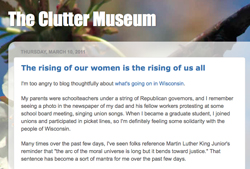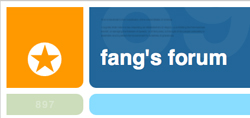I.
I inhabit a lot of different social and cultural worlds, and sometimes the adjacency of posts on Facebook is stunning. I can’t share tonight’s example because a lot of people might misunderstand my motivation for highlighting it. I will say this: as someone with a diverse circle of Facebook friends, I have the privilege of listening in on conversations that a lot of people don’t get to hear.
As a progressive, I get to eavesdrop on the conversations of my (often profoundly) conservative friends. As an atheist, I get glimpses of the perspectives of my pastor friends. As a white person, I get to listen in on conversations about the struggles and fears of my friends of color. Tonight, reading two Facebook posts and their ensuing comment streams side-by-side, I saw worlds colliding. One friend’s circle occupies a cultural context that lets its members clearly see the collision; the other friend’s circle does not, and might even deny that their worlds are colliding. It’s stunning, really, especially since, when worlds collide, neither world survives.
Hug your kids or the people you love tonight, and know that people you might see as very unlike you are doing the exact same thing.
II.
Elsewhere in my Facebook stream, a friend shared his pastor’s comparing having a call—by which she meant knowing what you are alive to do—with being pregnant with Christ. He wrote, “Your call in the world, the place where your deep gladness meets the world’s deep need, is the same role as being Mary or Elizabeth.”
The post was an explicit invitation to ponder, and another friend alluded to Frederick Buechner’s quote, from Wishful Thinking: A Seeker’s ABC, that “The place God calls you to is the place where your deep gladness and the world’s deep hunger meet.”
But what do we do when we sense so much deep hunger? And if we’re fortunate enough to feel deep gladness in a number of ways?
III.
It might seem odd for a depressive to admit to deep gladness, but there it is.
IV.
At what point do we acknowledge that the world’s deep hunger has met our deep gladness in a way that is unsustainable, that exhausts us?
I’ve been thinking about this in the context of teaching, of advising and mentoring. It’s a labor of love–and I mean that in a literal way, not in the way the cliché often gets used. Which is to say: I don’t mean that it’s work I do because I love it; rather, it is work that requires love.
It’s exhausting.
V.
I passed a couple of hours earlier this week talking with two friends–one a coworker, one a grad student–for whom being Christian is not only at the core of their identity, it is their primary identity. They were both stunned to learn I am not a believer–or, not a believer in any conventional sense–and we had a wide-ranging conversation that moved from them probing me about my failure to believe to me trying to understand the nuanced differences between their denominational commitments and perspectives.
I love talking with people whom I admire but with whom I disagree profoundly about important things. Such conversations are how we grow.
VI.
That’s part of why I haven’t been writing in these parts for several weeks. I’ve been having amazing conversations about religion, education, technology, parenting, marriage, humanities, citizenship, librarianship, and the past. The conversations have taken me back to reading poetry, as well as new nonfiction and fiction. And, of course, to research, old and new.
I’m learning so much, but this semester has been a time of listening and quiet reflection rather than writing. I’ll be using my voice again in 2015.
Until then, I’m wishing you all the best for the holidays and the new year.


Thanks for sharing all these lovely and complex thoughts. I will try to come back and comment in more detail, but for now I just wanted to say that I enjoy these rich, deep discussions and questions. And still very much want to meet in person someday!